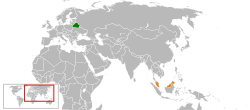 | |
Belarus | Malaysia |
|---|---|
Belarus and Malaysia established diplomatic relations in 1992. Neither country has a resident ambassador. Belarus embassy in Jakarta is accredited to Malaysia. [1] Both countries are members of the Non-Aligned Movement.
 | |
Belarus | Malaysia |
|---|---|
Belarus and Malaysia established diplomatic relations in 1992. Neither country has a resident ambassador. Belarus embassy in Jakarta is accredited to Malaysia. [1] Both countries are members of the Non-Aligned Movement.
Relations between the two countries have been established since 5 March 1992 with the focus mainly on economic co-operation. [1] In February 2003, the Belarusian Minister of Foreign Affairs Mikhail Khvostov took part in the 13th Summit of the Non-Aligned Movement (NAM) in Kuala Lumpur, Malaysia. [2]
Major exports from Belarus are potash and nitrogen fertilisers, while the main imports from Malaysia are rubber, lamps and tubes, cocoa, TV sets, video monitors, video projectors and radios. [1] Currently, Belarus is keen to expand trade and investment ties, [3] and increase export of potash fertilisers and tires to Malaysia. [4] In 2013, a Belarus National Exposition has been launched in Malaysia to features high-tech and innovative products from Belarus. [5] The Belarusian region of Minsk Oblast has announced its intention to develop co-operation with the Malaysian state of Sabah, with the Belarusian side said that the relations in all spheres between the two countries should develop more actively, including between regions. [6]
Malaysia is also seeking military co-operation with Belarus to repair its military aircraft. [7]

The Byelorussian SSR was one of only two Soviet republics to be separate members of the United Nations. Both republics and the Soviet Union joined the UN when the organization was founded in 1945.
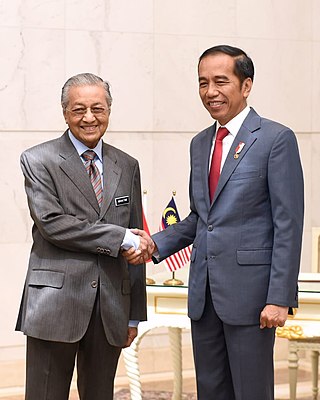
Since independence, Indonesian foreign relations have adhered to a "free and active" foreign policy, seeking to play a role in regional affairs commensurate with its size and location but avoiding involvement in conflicts among major powers. During the presidency of Sukarno, Indonesia's foreign relations were marked by engagement with other newly independent nations in Asia and Africa, as exemplified by the Bandung Conference, the subsequent foundation of the Non-Aligned Movement and a confrontational attitude towards Western powers, justified by a belief in the CONEFO and opposition to what Sukarno termed as NEKOLIM.

Malaysia is an active member of various international organisations, including the Commonwealth of Nations, the United Nations, the Organisation of Islamic Cooperation, and the Non-Aligned Movement. It has also in recent times been an active proponent of regional co-operation.
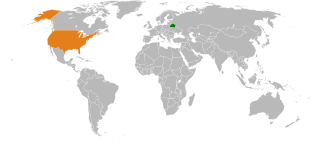
Interstate relations between the United States and Belarus began in 1991 upon the dissolution of the Soviet Union, of which Belarus had been a part. However, the relations have turned sour due to accusations by the United States that Belarus has been violating human rights. Belarus, in turn, has accused the United States of interfering in its internal affairs.
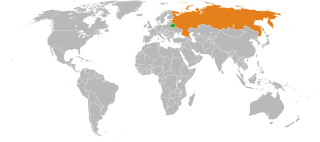
Belarus and Russia share a land border and constitute the supranational Union State. Several treaties have been concluded between the two nations bilaterally. Russia is Belarus' largest and most important economic and political partner. Both are members of various international organizations, including the Commonwealth of Independent States, the Eurasian Economic Union, the Collective Security Treaty Organization, and the United Nations.
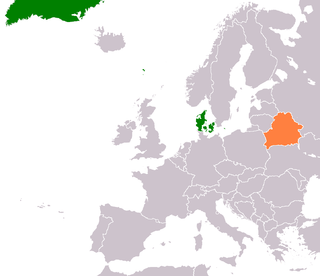
Belarus is diplomatically represented in Denmark through its embassy in Stockholm, Sweden. Denmark is represented through its embassy in Moscow, Russia. Denmark, together with Norway recognized and established relations with Belarus on January 14, 1992. Both countries are members of the Organization for Security and Co-operation in Europe and Denmark is a full member of Council of Europe while Belarus is an official candidate.

Relations between Azerbaijan and Belarus are at very high level that Belarusian president Alexander Lukashenko describes Azerbaijan as a "saver" of independence and sovereignty of Belarus and adds that "there's not anything close" in Azerbaijani-Belarusian relations. Both countries were part of the Russian Empire until 1918 and before 1991, they were part of the Soviet Union. Azerbaijan has an embassy in Minsk and Belarus has an embassy in Baku. Both countries are full members of the Organization for Security and Co-operation in Europe (OSCE) and the Commonwealth of Independent States (CIS). Azerbaijan is a full member of the Council of Europe, Belarus is a candidate. Both Azerbaijan and Belarus are full members of the Non-Aligned Movement (NAM). There are more than 6,000 Azerbaijanis living in Belarus.

Malaysia–Ukraine relations are the bilateral relations between Malaysia and Ukraine. Malaysia has an embassy in Kyiv, and Ukraine has an embassy in Kuala Lumpur.
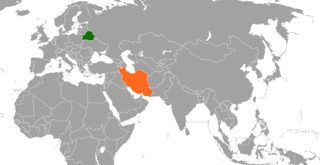
The Byelorussian Soviet Socialist Republic recognized de facto the Islamic Republic of Iran in February 1979, and Belarus and Iran established de jure diplomatic relations in 1992. Belarus has an embassy in Tehran. Iran has an embassy in Minsk.

Diplomatic relations between Belarus and Uzbekistan were established on 21 January 1993, with the Belarusian Embassy in Tashkent being opened in February 1994. Uzbekistan also has an embassy in Minsk.
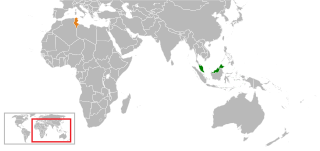
Malaysia–Tunisia relations refers to bilateral foreign relations between Malaysia and Tunisia. Diplomatic relations established in 1962. The Malaysian Embassy in Algiers covers Tunisia while the Tunisian Embassy in Jakarta covers Malaysia. The relations are mainly in economic relations with several agreements has been signed. On 24 November 1992, Malaysian Prime Minister Mahathir Mohamad arrived Tunisia to begin a three-day official visit. Both countries are members of the Organisation of Islamic Cooperation, Group of 77 and Non-Aligned Movement.
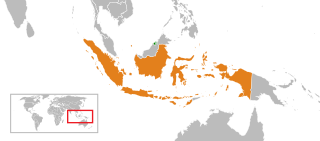
Brunei Darussalam and Indonesia established diplomatic relations in 1984. Since then, both countries enjoy warm and friendly relations. Brunei has an embassy in Jakarta, while Indonesia has an embassy in Bandar Seri Begawan. Indonesia and Brunei don't share direct land borders. Since diplomatic relations were established back in 1984, relations between the two countries overall progressed well, and both sides continued to enjoy strong ties in a wide spectrum of co-operations; including trade and investment, tourism, agriculture, marine and fisheries, health, defence, transnational crimes, education, youth, culture and people-to-people contacts.
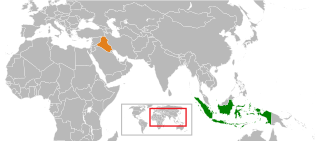
Indonesia and Iraq established diplomatic relations on 27 February 1950 when President Sukarno appointed Bagindo Dahlan Abdullah, a member of the Central Indonesia National Committee, to serve as the ambassador of the United States of Indonesia to Iraq, Syria, Lebanon, and Jordan with a permanent residence in Baghdad. Diplomatic relations are important since they share similarity as Muslim majority countries. Indonesia is the most populous Muslim country in the world, while Iraq also a Muslim majority nation. Diplomatic relations were established in 1950. Indonesia has an embassy in Baghdad, while Iraq has an embassy in Jakarta. Both nations are members of the Non-Aligned Movement and Organisation of Islamic Cooperation (OIC).

Bosnia and Herzegovina–Malaysia relations refers to the foreign relations between Bosnia and Herzegovina and Malaysia. Bosnia and Herzegovina has an embassy in Kuala Lumpur, and Malaysia has an embassy in Sarajevo.
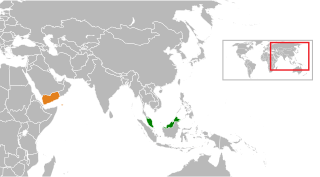
Malaysia–Yemen relations are foreign relations between Malaysia and Yemen. Malaysia formerly had an embassy in Sana'a, of which its operations had been relocated to Muscat, Oman and Yemen has an embassy in Kuala Lumpur.

Malaysia–Nepal relations refers to bilateral foreign relations between Malaysia and Nepal. Malaysia has an embassy in Kathmandu, and Nepal has an embassy in Kuala Lumpur.

Malaysia–Poland relations refers to bilateral foreign relations between Malaysia and Poland. Malaysia has an embassy in Warsaw, and Poland has an embassy in Kuala Lumpur and consulates in Kuching and George Town.

Ethiopia and Indonesia established diplomatic relations on 20 June 1961, followed by the opening of an Indonesian embassy in Addis Ababa in 1964, also accredited to Djibouti. Ethiopia established an embassy in Jakarta in the second half of 2016. Arega Hailu Teffera, Ambassador Extraordinary and Plenipotentiary of the Federal Democratic Republic of Ethiopia to Indonesia presented his credentials to President Joko Widodo on 23 February 2017. The Embassy of Ethiopia in Jakarta is accredited to ASEAN HQ, Malaysia, Singapore, Cambodia, the Maldives and Pakistan. Both nations are members of the Non-Aligned Movement and the Group of 77.

The nations of Belarus and Mexico established diplomatic relations in 1992. Both nations are members of the United Nations.

Belarus and Vietnam established official relations in 1991, with the collapse of the Soviet Union. Belarus has an official embassy in Hanoi and Vietnam has its counterpart in Minsk.